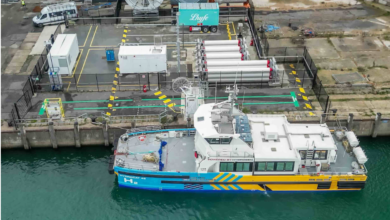ZeroAvia signs up with De Havilland Canada and secures funding from United Airlines
ZeroAvia is preparing for ground and flight testing of its first commercial intent product in the coming weeks.

ZeroAvia and De Havilland Aircraft of Canada Limited have signed an MoU to develop a line-fit and retrofit program for De Havilland Canada’s aircraft models, using hydrogen-electric propulsion in both new and in-service aircraft.
De Havilland Canada will be issued options to purchase 50 ZeroAvia hydrogen-electric engines. They will work together on a service bulletin for the Dash 8-400 type certificate offering ZeroAvia’s hydrogen-electric engine as a line-fit option for new aircraft and developing an OEM-approved retrofit program for in-service aircraft.
The program will target the use of ZeroAvia’s 2MW+ powertrain (ZA2000) for Dash 8-400 aircraft. As part of the program, ZeroAvia will develop a flight demonstrator, with De Havilland Canada’s support, using a Dash 8-400 aircraft to aid certification and showcase the operational and commercial potential of the engine. The aim is to identify a suitable existing route suing the aircraft and aim for entry into service within five years. ZeroAvia and De Havilland Canada intend to jointly market aircraft powered by hydrogen-electric engines to operators with power-by-the-hour (PBH) support.
Meanwhile, ZeroAvia has secured a new raise of $35 million to help develop its 2-5 MW zero-emission powertrain system for regional aviation. United Airlines has invested in ZeroAvia through this round, and its agreement with United anticipates an order for 50 ZA2000-RJ engines, with an option for 50 more. United joins an already announced new investor, Alaska Air Group, in this round, alongside existing investors Amazon’s Climate Pledge Fund, AP Ventures, Breakthrough Energy Ventures, Horizons Ventures, Summa Equity, and Shell Ventures. This brings the company’s total investment to date up to $115 million.
This funding round targets the next segment of 40-80 seat aircraft, targeting turboprops by 2026 and regional jets by 2028. The funding will also allow ZeroAvia to further ramp up its presence across its US, UK, and continental Europe locations.
